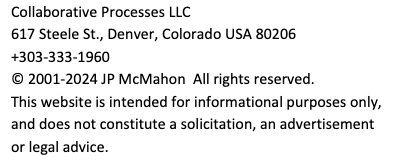Recommended Group Objectives for Collaboration
Group Objectives for an Effective Meeting[1]
- All participants prepare for, and fully participate, in the meeting.
- Participants know that they are responsible for their decisions and the outcome of the meeting.
- Participants maintain flexibility, consider multiple options in making decisions, and, for the purposes of this discussion, ‘suspend’ their prior assumptions.
- Participants regard and treat one another as colleagues.
- Participants accept that the ‘facilitator’ ‘holds the context’ of dialogue – but know that the facilitator does not control or push the outcome.
- Participants share all relevant information and do so in ways that others understand it. As needed, Participants disclose uncertainty, hypothesis and lack of knowledge—rather than concede it reluctantly.
- Participants maintain flexibility and continually seek new information to determine whether previous decisions should be changed.
- Participants explain their own objectives and interests.
- Participants are not coerced or manipulated.
- Participants base their choices on valid or best available information.
- Participants work for outcomes that not only meet their own interests but also satisfy the interests of the other participants.
Agreements by Participants
Approach, attitude and process
- We will work together in good faith, adhere to the agreed-upon agenda and time limits, and honor these agreements.
- We will reciprocate concessions and return favors.
- We will voluntarily disclose our interest in the outcome and bias.
- We will be responsive to the other’s legitimate needs.
- We will work toward the agreed upon goals of the group.
Communication
- We share speaking time, and will not make speeches, dominate discussion or waste time.
- We recognize our responsibility to both (a) state our view and (b) listen to the other party’s view. Accordingly, we will solicit the other’s view, listen responsively and help the other, as needed, to participate fully.
- We will avoid dogmatism, posturing, emotionalism, rudeness, blame and threats.
- We will avoid unjustified assumptions and off-the-cuff comments.
- Extremism may be countered forcefully when justified, but not with extremism.

